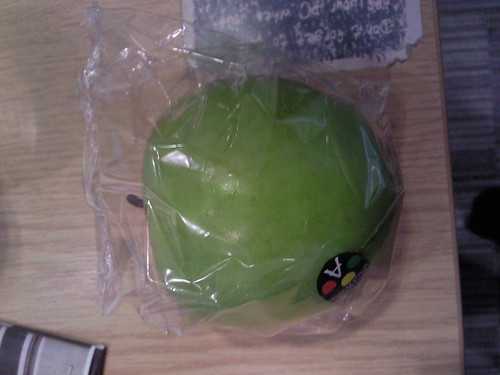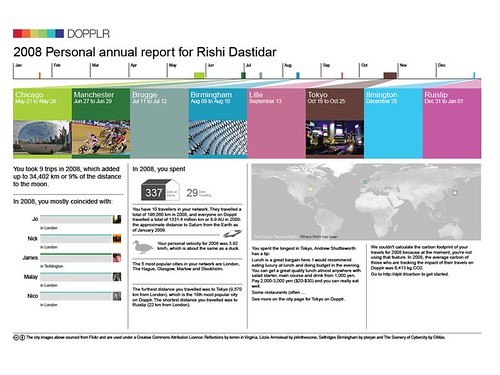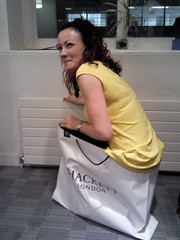Commercial: The Really Interesting newspaper
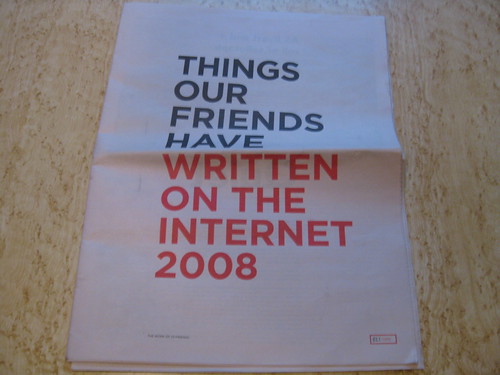
So on Saturday morning, my copy of Russell Davies and Ben Terrett’s newspaper, 'Things our friends have written on the internet 2008' arrived, the first thing out from their Really Interesting Group.
And very good it looked too, from the brief flick I gave it. I popped it into my bag with me to read on the bus. And I had a bit of a read of it on the bus. Managed to get through most of it. And mostly it read very well.
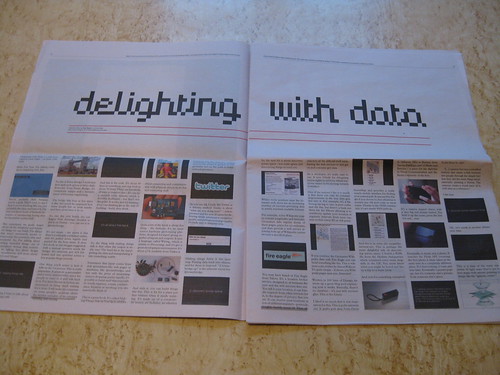
Later, I was in Chelsea to see Frost/Nixon. And it was only after coming out of Frost/Nixon that I realised that, actually, the newspaper actually isn’t very good at all. The Frost/Nixon bit is important. I’ll explain why later.
The problems with the newspaper first:
1. It’s been designed, not subbed (Ben describes the design process here)
Which is to say that it looks and feels like it’s been put together by someone who hasn’t done much editorial design; and has forgotten that the point of ink on a page in something calling itself a 'newspaper' is to help people to read it.
What it is badly missing is a sub-editor, and I don’t mean in the sense of someone who ensures that spellings are checked, grammar works and so on (although of course a sub must do that), but in the widest of the sub’s roles, which is to ensure that a page is read.
When I trained as a sub at the Financial Times, we were taught repeatedly that you must always create ‘ways in’ into an article, and the page spread, and try to account for potentially differing speeds of consumption and comprehension. Will some people read from word one to the end, in order? Yes. But not many. Instead you have people who will declare an article read from just the straplines and the subheads; people who start in the middle and work out; people who read the sidebars and graphics and infoboxes and pull quotes and then move on.
This isn’t right or wrong. It’s what people do. And if you don’t have those pieces of ‘page furniture’, then a) you’re not selling the piece and the page spread hard enough and so b) you’re making it more likely that they won’t read the thing at all.
And there are a number of spreads in 'Things...' which, on this basis, are shockers. The Mars Phoenix twitter feed is one. Yes it looks great,
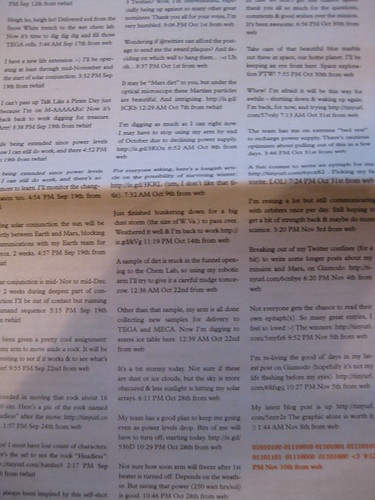
but did you read it? Of course not. You alighted on two or three tweets at random and then turned over. And it would have been so easy to fix too. Just turn one or two of them into in-column pull quotes, maybe 1.5 times smaller than the headline. Instantly more variety on the page, and something that’s easier on the eye.
Dan Hill’s piece is treated pretty unforgiveably. His stuff is always worthwhile, but dense and complex, needing patience and time to read (I normally end up printing his posts out on to A4 to make them easier to go through). Four pages of closely set text, with few subheads, no sidebars to break things up, no images, no navigational clues whatsoever, was a gross miservice to him as a writer.
Note for next time: you can’t just rely on a headline to pull people in and persuade them to read.
2) It's not been edited properly
It's a newspaper that's been 'selected', and that’s not the same as editing. Now, that’s not to quibble with the writing itself, per se, which is all pretty good, as you’d expect from the calibre of the people selected, and that’s not to say that individual pieces don’t work, because they do.
But what this newspaper lacks are changes of tone and pace. I guess you have to expect this from something that has been put together to celebrate things that friends have written, but it’s striking that nearly all the piece strike the same quasi-chummy, informationally rich, laid-back chatty rhetoric of, well, Russell and Ben. By the end, I was craving a voice of someone who wasn’t a friend, who didn’t write interesting things in limpid phrases, but instead was blocky, shouty, confrontational, not quiet. Different.
Of course, the best newspapers know this, and are adept at finding writers and voice who act as grit in the oyster, who rough up and antagonise their readership, stick out in terms of style, politics, subjects covered, because that’s how you keep people interested and reading. It’s odd that a selection of writing from the blogosphere managed to be so non-confrontational.
There wasn’t enough grit. And that shines light on problem number three:
3) It doesn’t have a point of view
Or rather the point of view it has, one of, ‘there is no point of view, this is just some interesting stuff’, isn’t actually a sufficiently interesting a point of view to get worked up about.
Which means that you don’t have the relationship with it that you should have with a newspaper – a passionate, committed one. Local or national, specialist or generalist, the very reason that newspapers have held such importance in our society, our democratic discourse, is that they moved rapidly away from being mere records of the day's events, ‘universal registers’, and instead are/were partisan, irritating, slipshod, incorrect, feisty, unexpected, infuriating, brilliant. Alive.
It’s always better if this life is/was grounded in something that recognisably ties paper and readership together: a locality, a shared political view. But even if it’s in the tabloid sense of just wanting to entertain, the worst thing a newspaper can be is inert and stripped of its vitality.
This newspaper was stripped of its vitality. The more interesting question is why.
Here’s where Frost/Nixon comes in. Now, in the main, it’s a largely successful adaptation of the eponymous stage play. Enough is opened up so that you don’t feel that a static camera is fixed forward, and there is enough faux intimacy to convince you that an emotional resonance has been created. (And the light! Oh, the light of California is wispy and sun-kissed and warm and delirious and is only slightly rammed home as a metaphor for the whole interview project, and the contrast with the darkness of Nixon – sorry, I digress).
But, it doesn’t all work. And the bit that really doesn’t is Nixon’s call to Frost on the eve of their final joust. On the stage, it had an ethereal, dream-like quality, so that you, the characters, the rest of the audience weren’t quite sure whether or not it had happened. The ambiguity meant that the moment could be freighted not just with Peter Morgan’s conceit that his two protagonists were actually quite similar, but also the sense that sometimes, just sometimes, what allows you to succeed will come at you as a chimera, and you have to seize it without fully realising what it is, seeing what it is for, or knowing where it will take you.
But you can’t get any of that ambiguity or nuance on film. When captured by camera, the call happened. End of. No question mark, no doubt, no ambiguity. Which means that you miss out on the emotional richness that the blurring of liminal states can achieve.
And why did resonate for this newspaper project? Well, it made clear a very old, and simple truism: just because something works in one medium, doesn’t mean it will work in another.
And that’s pretty much the case here. We’ve sort of been suckered into the idea that if we reinvent something, change it up enough, we can get not only the best of the old, but also the best of the new – the freshness, a new way of looking at things and so on. And clearly, that was some of the thinking going on here – can we make the newspaper interesting again? The answer, it appears, was something along the lines of, ‘Well, we can if we don’t have inside it what’s normally in it.’
But for that to work, you need to actually have all the old frameworks in place, to persuade and convince that by blurring them, you are actually creating something new, and that you haven’t just forgotten about rules which have served us well and aided comprehension and enjoyment. The craft skills, the experience, not just the desire to print things, but the knowledge of to know how to make print - newspapers - work.
My worry is that if, as is the implication, that more print projects like this can be produced through automation, tagging and little human judgement as to what is effective on the page, then all we’ll be doing is little more than chopping down trees for the sake of vanity.
Overall, my argument here is that, with a bit more knowledge, a bit more expertise and dare one say it, a bit more humility, something better and yes, more interesting than 'Things...' could have been made. As it is, it is half-cocked. Which isn’t that interesting at all.
Labels: commercial really interesting newspaper things written internet 2008 frost nixon print
